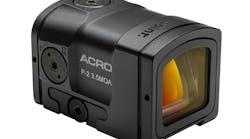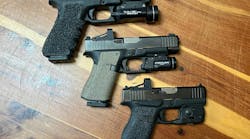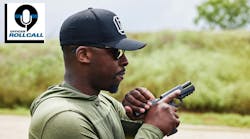Kenneth Lee was a convicted felon who wanted a gun, authorities say. Darlene Hoover was a single mom with a clean record who needed cash.
So the two acquaintances from the South Side made a deal, according to prosecutors. For $200, Hoover drove about 40 miles to an unassuming strip mall in southwest suburban Plainfield to buy a semi-automatic handgun for Lee, lying on a federal form by claiming to be the owner.
It took nearly five years for the consequences of that illegal "straw purchase" to play out on a recent Chicago night. Armed with the blue steel .40-caliber, Lee shot at a man on the street, police said. As a result, Hoover now finds herself in prison serving a four-year sentence.
Deterring these covert gun purchases -- a key way for criminals to get their hands on firearms -- has proved to be a daunting task for law enforcement. Many straw purchasers see the opportunity as easy money and a victimless, paperwork crime. After a weapon recovered at a crime scene has been traced to the original buyer, most simply claim the gun had been stolen or lost, crippling any possible prosecution.
Straw purchasing has been at the forefront of the gun debate that has raged across the country since the Connecticut school massacre. As Hoover's case quietly and quickly moved through Cook County court, state and federal legislators have sought to stiffen penalties and close loopholes to try to clamp down on the crime. But measures in both Springfield and Washington have stalled amid heated opposition from gun advocate groups.
"It's not just a paper violation," Thomas Mahoney, supervisor of the gangs unit for the Cook County state's attorney's office, said of straw purchases. "It goes much deeper than that, and it can have real, dire consequences."
The gun trace
It was an unusually warm Saturday evening in January when Lee ran down a street in Chicago's South Shore neighborhood, raised the Smith & Wesson semi-automatic and opened fire on a man on the busy block, prosecutors alleged.
No one was hit by the three bullets, but a Chicago police sergeant witnessed the shooting and gave chase with other officers. Lee, who has past convictions for weapons and narcotics offenses, was apprehended after he ran into a house where he had been staying, police said.
Officers said they found the Smith & Wesson -- the make of handgun most popular among Chicago's violent criminals, according to police -- hidden under a pile of clothes in the basement. In a closet, police found 136 rounds of .40-caliber ammunition as well as a Tec-DC9 pistol with a high-capacity 30-round magazine, court records show.
In a city where daily headlines mark the tide of gun violence -- 13 people were struck by bullets that weekend alone -- it was an unremarkable shooting. Lee, a reputed Black Disciple gang member with a six-point star tattoo on his shoulder, was later indicted on attempted murder charges. He has pleaded not guilty and is free on bond while awaiting trial.
Tracing the gun's history, investigators discovered that Hoover bought the Smith & Wesson in June 2008 at The Gun Shop Inc. in Plainfield.
The month after Lee's arrest, police showed up at the two-flat home in the 7800 block of South Cregier Avenue that Hoover shared with her mother and 16-year-old daughter and took her in for questioning, records show.
Investigators caught a rare break. Within hours, Hoover, at the time a security guard at O'Hare International Airport, signed an admission that she had bought four guns in all for Lee on three separate occasions between 2007 and 2011. According to court records, she acknowledged making two of the purchases at the now-shuttered Plainfield gun shop and the other two at Leising's Firearms, a tiny, second-story shop tucked behind a gyros stand in south suburban Chicago Heights.
Lee fronted the money for the guns and paid Hoover $200 for each, prosecutors said. With each purchase, Hoover had to return to the gun shops a second time to pick up the weapons after clearing a background check and waiting period of several days. She then met Lee in a parking lot at the congested, six-corner intersection at 8300 S. South Chicago Avenue and handed over the weapons, according to prosecutors.
'Lost or stolen law'
The U.S. Bureau of Alcohol, Tobacco, Firearms and Explosives, the federal agency that enforces gun laws, has called stopping straw purchases a "top priority."
Experts say it is impossible to know how many straw purchases happen given the shadowy world in which they occur. The University of Chicago Crime Lab, which studies how to reduce violence, is seeking a grant to look into illicit gun pipelines in Chicago, New York, Los Angeles and Boston.
According to an analysis by the U. of C. lab of data from a recent four-year period, most of the guns recovered by Chicago police that moved quickly from a legal sale to illegal use had been bought in Illinois gun shops. Such a short "time-to-crime" is a strong indicator of a straw purchase, experts say.
Chicago police and Cook County prosecutors have been pushing in Springfield for a "lost or stolen law" to close what they argue is a crucial loophole. The law would require gun owners to report a lost or stolen weapon within 72 hours of noticing it missing or face a possible felony charge.
The hope is that straw purchasers would be less likely to help out a friend if they know they have to report a gun missing. And multiple reports of a lost or stolen gun by individuals would help law enforcement detect a straw purchasing scheme. But the measure has been strongly opposed by the National Rifle Association and other gun-rights groups and is stalled in a legislative committee.
Steeper penalties for straw purchasers have also been proposed as part of federal legislation introduced in the wake of the school shooting in Newtown, Conn. Sen. Mark Kirk named part of one gun-control bill aimed at straw purchasing after Hadiya Pendleton, the 15-year-old Chicago honors student whose homicide in January became a national symbol of gun violence. But that measure failed to pass the U.S. Senate last month.
Impatient with the little progress on the legislative front, gun-control advocates are trying creative approaches to confront straw purchasing. Just two weeks ago, the Brady Center to Prevent Gun Violence sued a Mississippi pawnshop, gun trafficker and straw purchaser for helping get a firearm into the hands of a gang member who killed a decorated Chicago police officer in 2010.
The gun shops
From 2008 to 2012, Chicago police traced some 60 guns recovered at crime scenes to the two stores where Hoover made her purchases for Lee, according to police data.
The Gun Shop Inc. closed several years ago and has since been converted into a physical therapy center.
In Chicago Heights, Leising's Firearms is marked only by a small sign pointing visitors to a parking lot next to a vacant bottled water depot. Visitors are buzzed upstairs and must show their firearm owner's identification card before entering the cramped, well-kept shop, which is adorned with military paraphernalia and kitschy decorations, including a croaking plastic frog at the door.
Leising's owner politely turned Tribune reporters away during a recent visit. The former owner of The Gun Shop did not return phone calls seeking comment.
Gun shop owners find themselves at the front lines in stopping straw purchases and under increasing pressure to recognize the Darlene Hoovers who walk through the front door.
To help gun shops detect a straw purchaser, ATF and the National Shooting Sports Foundation have created tip sheets for gun sellers on how to spot questionable customers. Multiple gun purchases and cash transactions are among the red flags.
One suburban gun seller said some shops might ignore the advice and take the easy cash from a straw purchase, but he believes they would be a minority.
"Most legitimate, on the up-and-up businesses would rather cut their finger off than have a straw purchase linked to the store, especially if it's a homicide," said Tim Zegar, who works at Schrank's Smoke 'N Gun Shop in Waukegan.
A former police officer, Zegar uses those street smarts to size up customers at the family-owned business.
A hat tilted the wrong way, gang colors, tattoos or clothing to cover up tattoos give him pause. Zegar said he has denied a sale to customers without the required FOID card, only to have a different individual come in five minutes later to inquire about the exact same gun.
Any of those circumstances would make Zegar deny the sale.
"I just say, 'I am sorry. I am not going to sell to you,'" he said. "I have been called all kinds of names and that's OK. ... We're under no obligation. This is a private business; we can choose who we sell to."
The straw purchaser
Law enforcement experts say most straw purchasers are motivated by a complicated set of factors. They typically have some sort of relationship -- often romantic -- with the felons who want the guns. They see the purchase as easy, quick cash, and know that if the police come knocking, they can lie and simply say they lost the weapon.
Many are surprised when confronted by police about the gun being used in a crime, sometimes years later.
"Some say it verbally," said Chicago police Sgt. Sam Dickerson, who oversaw Hoover's investigation. "You can see it (in their faces). It's the surprise or fear. ... They are the not the gang-banger type we usually encounter."
Hoover's attorney, Preston Bowie, maintained that Hoover signed her confession after police assured her she would then be able to go home. She was unaware that by admitting she had bought the guns for Lee, she was subjecting herself to a charge of gunrunning, a felony that can bring up to 15 years in prison, he said.
By the time he talked to her at the Cook County Jail, Hoover seemed shell-shocked, said Bowie, a retired Cook County judge.
"It was difficult for her to even talk about it with me she was so upset," Bowie said.
In several brief court appearances over the past two months, Hoover has shuffled into court with a glazed expression while dressed in a jail jumpsuit.
She declined an interview through her attorney, and her mother and several friends contacted by the newspaper would not comment.
In the gang-infested South Shore neighborhood where Hoover was raised, guns are a part of everyday life. Gang graffiti marks buildings on her block, and on nearby 79th Street, groups of young men loiter on corners and exchange gang handshakes. According to police statistics, 22 people have been shot to death in the South Shore community since the beginning of 2012.
Hoover, a graduate of St. Frances de Sales High School, received her firearms training certification in 1996 from Illinois regulators, allowing her to work as a security guard, records show.
As a single mom, Hoover struggled financially. At the time of her arrest, she also was her mother's sole support.
Authorities said Hoover was battling problems with alcohol and drugs and in need of money when Lee -- a friend of her brother's whom she knew from the neighborhood -- approached her.
In April, her lawyer successfully argued to have her bond lowered, but her mother still couldn't afford to pay, and Hoover did not want to take out another mortgage on their house.
"She decided she just wanted to get it over with," Bowie said of her decision to plead guilty. "(With) the details she told the police in her statement, there was not much she could do."
Hoover is scheduled to be released on parole in February 2016.
As for the other three guns she bought for Lee, authorities said, the whereabouts of two of them remain unknown.
Mahoney, the gang crimes prosecutor, said the next time those weapons surface could be at a crime scene -- and that should be a cause for alarm.
"The worst case scenario, they're used to kill somebody," he said.
Copyright 2013 - Chicago Tribune
McClatchy-Tribune News Service


